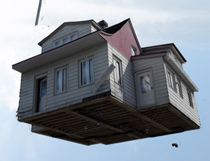Like a Happy Driftwood on the Sea
Prosenjit Dey Chaudhury
The journey over a hidden, unflinching ocean was simple, with mist swirling and tossing under the window in the sky to give niggardly glimpses of a grey adamantine surface that made the bosom of the earth. No life was present upon that surface, no untoward crease cut across its troughs; and the traveller was bid to fly by swiftly to a destination solid more in its touch of welcome than in its share of the desolate sublunary crust.
The window of his present room in the city is large, very large, and it shows a stern, leaden sky, below which the rim of an extensive edifice in the offsetting colour of cream makes the summit of a cascade of rims down to the sill of the window. He learnt early to identify the oak, pine and maple trees outside by their leaves and needles. The step of the cascade immediately above the sill is that of the bar of the lozenge fence outside, on which chordate leaves burnt with the light of primeval, healthy green spread their palms to the sky. The sprigs of the oak stir with the breath of the wind while the rain-wet, leafier branches of the maple move reluctantly to that breath. Inside a window in a gallery next to the pine there is a light that betokens warmth against the chill that must be descending on the world outside. Occasionally a car flits across the alley skirting the fence and birds appear to be cheeping somewhere. Apart from these and the light in the window, and, of course, the drunken, hearty drawl on the telephone in the adjoining apartment, there are no other signs of life.
He likes the world as it spreads in crepuscular solemnity and becomes replete with secrets. In every approach of the dark from without he knows, nonetheless, that he lives in a sunshine city that has become one of his vital members: perhaps he made the city a member, perhaps the city decided to live inside him. He grew an arm every time he went out and forgot every name in history till he thought he was the only person alive in a world of houses and snow. If ever he cut one of these arms he felt the pang of the loss and tried to grow it again. He knows he walked out into a dizzying entrancement that is not usually within the contemplation of the inner spirit. Straight streets and straight houses arose from the city and were alive; a certain uplifting ozone made a capture of the mind from a cobalt blue firmament and a whisper in the air became a fragrance when the moon was sailing among dishevelled clouds. The straight lines of the roads and the houses suddenly left behind their straight, linguistic meaning and the world gave a sense of something prehensile that is meant to live forever.
In looking out of the window he wonders what is to happen in the cascading rush of time into which everyone must fall. Nothing may have changed outside, certainly nothing seems to have changed in the walls that are touched with the hands and the hands that are seen with the eyes; there is change in the constitution of each season such that this one may be more warped than the one before and that one may be more illustrative of a consensual prediction of the climate than this one; yet, in this flux, the calm for the individual often arrives when the seeds of momentous change have been sown so deep that they cannot be seen. Such is his calm and he must tell himself that something has changed inside. “I still trace with a shudder the contours of the world I have seen, for they made this whole jangling self prick up and give attention to a voice, to a realization, a constat, a merveille, a sentiment, a promise, a fulfilment, the giddiness of ozone and the whisper of the dark.”




very descriptive